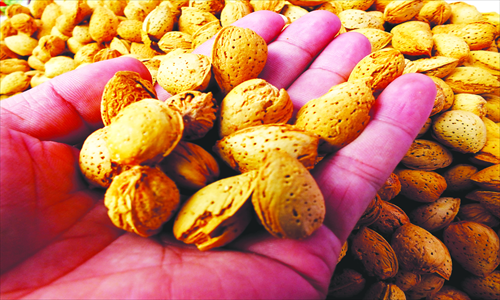Lost in translation

"I think from now on I will prefer other nuts rather than almonds," Zhao Hong, a white-collar worker, told the Global Times Wednesday at a Walmart store in Dawang Lu, Beijing.
Zhao said she had been buying the so-called American big apricot kernels for years, because she thought the nuts can help increase immunity and prevent cancer.
"But when I heard that the nuts I bought are in fact almonds, I felt I'd been cheated," she said, adding that she does not understand why it took so long for the authorities to correct the wrong translation.
According to Wang Jianyou, an agricultural expert at the Xinjiang Academy of Forestry Sciences, the nutritional values in apricot kernels and almonds are both high, but unlike almonds, apricot kernels have certain medicinal effects, such as relieving asthma and coughs.
Meng Xianwu, director of the Working Committee of Apricot Kernels at the Association of Cash Forest of China under the State Forestry Administration, told the Global Times that the committee has been working on making the correction. But, "it is difficult," he said.
Impressive debut
According to the non-profit organization Almond Board of California (ABC), California almonds were first exported to China as early as in the 1970s, and several different names were used at that time, including xingren (apricot kernels), badanmu (almonds) and biantaoren (flat peach kernels), based on Chinese reference documents including English-Chinese dictionaries.
However, among these names, xingren was most widely used. And over 10 years ago, meiguo daxingren, which literally means "American big apricot kernels," started to be used to identify almonds from California in the Chinese market.
"But the translation is wrong and has confused consumers for years," said Meng, noting that partly because of the translation, the product became popular in China, and is also sold for higher prices.
Robert Curtis, associate director of agricultural affairs with ABC, was quoted as saying by US-based agricultural news portal Capital Press earlier this month that China consumes nearly 300 million pounds (136 million kilograms) of almonds a year.
Curtis said he also expected almond sales to rise in China, as the world's second largest economy is undergoing urbanization and people have developed more Western tastes.
According to Meng, the California almonds sell for about 120 yuan ($19) per kilogram at retail, while Chinese apricot kernels cost only about 40 yuan per kilogram.
"The translation misled me, and I thought the almonds were apricot kernels from the US," said Zhao, noting that she thought the US exported agricultural products are usually bigger in size and look better than Chinese products, so she accepted the higher prices.
However, Meng said he thinks the sales of Chinese products will increase, as the incorrect translation will be corrected soon.
Mistake spotted
The mistake was first spotted by the Specialized Committee for Roasted Seeds and Nuts (CRSN) of the China National Food Industry Association in 2009, which was trying to draft industry standards for apricot kernels.
"But we were shocked when the ABC told us the 'American big apricot kernels' are not apricot kernels, and so have no association with the compilation of the industry standards," Weng Yangyang, secretary-general of the specialized committee, told the Global Times Tuesday.
After negotiations between the committee and the ABC, an announcement was issued by the ABC on December 6 stating that in future it will use the name badanmu (almonds) as the Chinese name for American almonds, instead of the current meiguo daxingren (American big apricot kernels).
On December 10 the CRSN announced that after several examinations it had certified that the so-called American big apricot kernels are in fact almonds. So the name of the nuts in the Chinese market must be changed.
ABC, which is still using the name of American big apricot kernels on its Chinese official website, refused to comment when contacted by the Global Times Wednesday.
However, the announcement issued by the CRSN also indicated that the names biantaoren, badanmu, and meiguo daxingren will continue to be used during the package labeling transition period.
Unfair advantage
Meng from the Association of Cash Forest of China said that if the name of the American almonds is changed, the country's apricot kernel companies will benefit greatly.
But the process is not that easy. In most supermarkets like Walmart, Carrefour and BHG in Beijing, there are few packages labeled as almonds, but American big apricot kernels are still widely available.
The Beijing Times newspaper reported earlier this month that Li Jianjun, an agriculture expert with the Association of Cash Forest of China, said the name of American big apricot kernels gave a competitive advantage to the imported products, and that domestic producers of the real apricot kernels have suffered as a result.
"Almonds can be easily puffed up during processing, while apricot kernels will be broken during the process. Consumers naturally would choose the bigger ones over the small ones," said Meng, noting that Chinese apricot kernel companies usually lack advanced food processing technology, which is another reason why consumers are more attracted to the imported almonds.
However, an insider from the nuts industry told the Global Times on condition of anonymity that many almond producers and importers are reluctant to change the apricot kernel name into almonds, as they are afraid that apricot kernel consumers may not continue to buy almonds anymore.
When asked about how CRSN can force almond producers to change their names, Weng said, "Don't ask me. I don't know."